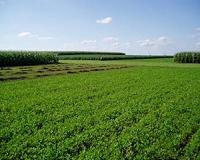 |
Hinche, Haiti (AFP) June 4, 2010 Thousands of farmers marched in central Haiti Friday claiming the government was misleading them with seed donations from US multinational Monsanto. The region was spared the worst of the January quake which leveled much of the capital Port-au-Prince, but with a dire shortage of seeds in the Caribbean country farmers are struggling to get the supplies to work their land. Giant company Monsanto is donating 475 tons of maize to Haitian farmers in cooperation with Project Winner, a USAID initiative, which aims to increase the country's agricultural productivity, the agriculture ministry said. But farmers fear they are being given seeds which could threaten local varieties. "The Haitian government is using the earthquake to sell the country to the multinationals," charged Jean Baptiste Chavannes, coordinator of the Mouvman Peyizan Papay (MPP), a farming cooperative and one of the leading organizations in Haiti's peasant movement. Sporting red shirts and straw hats sprayed in signs against President Rene Preval and Monsanto, people rallied under a hot sun in the town of Hinche. Demonstrators chanted "Down with Preval," "Keep Monsanto Out of Haiti" and the occasional "Down with the Occupation." Kettly Alexandre, an organizer with the MPP said they estimated the number of participants was between 8,000 and 12,000. There was no immediate confirmation from police. "We have to fight for our local seeds," Chavannes told the crowd. "We have to defend our food sovereignty." "This is not just about the seeds," argued Samuel Smith, a 74-year-old organic farmer and long-time supporter of local agriculture, who came for the rally from Massachusetts. "It's about imposing on people a system that they can't get out of." Monsanto however dismissed fears it was donating genetically modified seeds to the country. "The seeds Monsanto is donating to Haiti are not genetically modified. They are conventional hybrid seeds that are already grown in the Dominican Republic," a Monsanto spokesman in the United States told AFP. Monsanto has donated 255,000 dollars to Haiti for disaster relief and the company is committed to the success of Haitian farmers, Monsanto Executive Vice President Jerry Stein wrote in a letter to Agriculture Minister Joanas Gue. But Chevannes slammed the donation as "a gift of death." "It's an attack on peasant agriculture, on the farmers, on biodiversity, on native seeds, on what remains of our environment in Haiti." Many protestors leveled most of their anger against the government. "I'm here because I'm angry with Preval," said Pierre Charite, a 61-year-old farmer from Haiti's central plateu, where he grows maize, plantains, sugarcane and pistachios. "He accepted corn that is bad, that will kill Haitian corn. I won't use that."
Share This Article With Planet Earth
Related Links Farming Today - Suppliers and Technology
 Sowing Seeds With New Agricultural Carbon Accounting Tool
Sowing Seeds With New Agricultural Carbon Accounting ToolOak Ridge TN (SPX) Jun 04, 2010 Carbon dioxide emissions from agricultural activity in the United States can now be tracked with unprecedented resolution because of a method developed at Oak Ridge National Laboratory. A team led by Tristram West uses satellite remote sensing, computational resources and high-resolution national inventory datasets to pinpoint agricultural-based carbon emissions nationwide. The metho ... read more |
|
| The content herein, unless otherwise known to be public domain, are Copyright 1995-2010 - SpaceDaily. AFP and UPI Wire Stories are copyright Agence France-Presse and United Press International. ESA Portal Reports are copyright European Space Agency. All NASA sourced material is public domain. Additional copyrights may apply in whole or part to other bona fide parties. Advertising does not imply endorsement,agreement or approval of any opinions, statements or information provided by SpaceDaily on any Web page published or hosted by SpaceDaily. Privacy Statement |